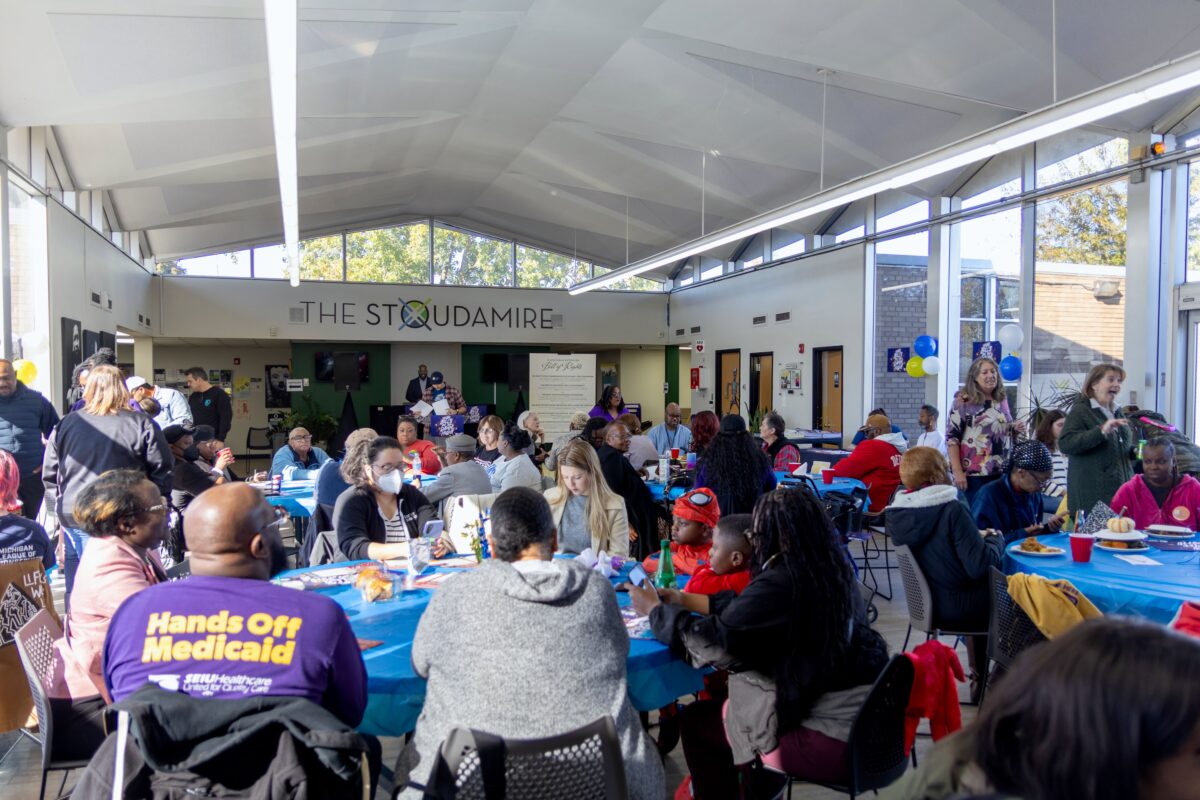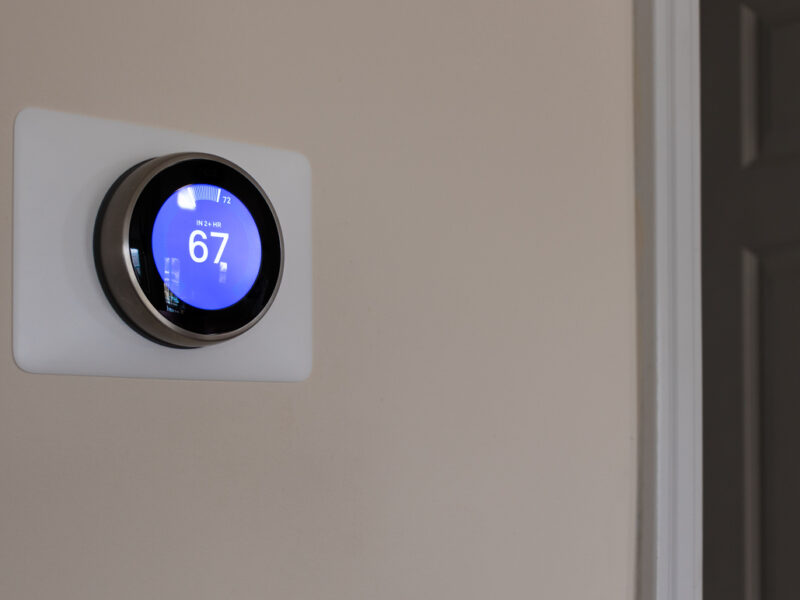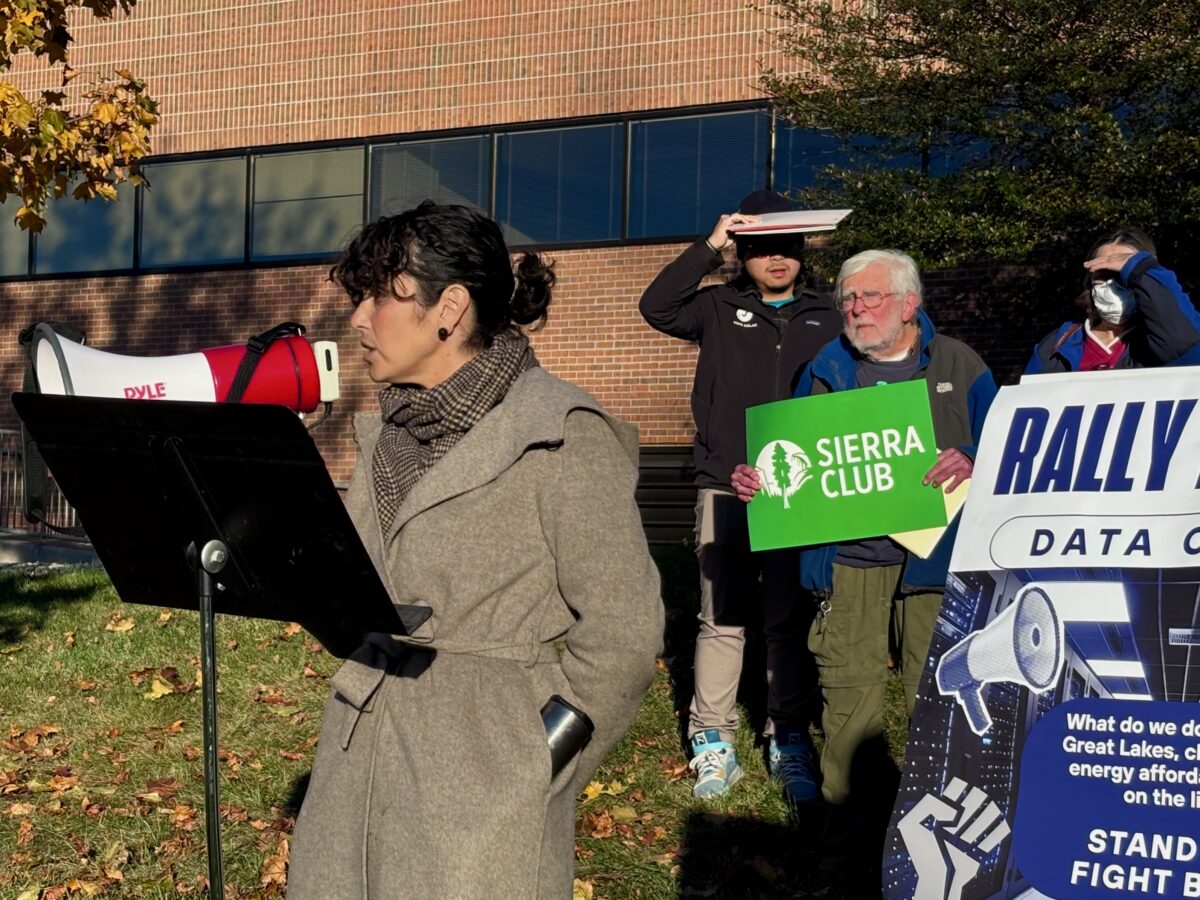Overview:
- Event on Detroit's east side focuses on bills in Michigan Legislature that target utilities like DTE Energy.
- The legislative push comes against a backdrop of requests by state utility companies for energy rate hikes.
- State Rep. Tonya Myers Phillips backs legislation that would prohibit shutoffs between November and March for older adults and families with children.
As a child care provider, mother of three, and grandmother of five, Roquesha O’Neal needs to have electricity running in her home.
More often than not, obtaining affordable and reliable service from DTE Energy is a challenge, the east side resident says.
“At the end of the day, if I pay for my service, I should be able to use my service,” O’Neal told Planet Detroit.
O’Neal is among several dozen who attended a “Our Bills Are Too Damn High” block party at Eastside Community Network’s Stoudamire Wellness Hub on Sunday.
The event, organized by the Michigan League of Conservation Voters, brought together residents, politicians, organizers, and union members to advocate in favor of a series of bills aimed at addressing surging utility costs, power outages, and shutoffs.
The legislation demands transparency around the executive pay and profits of major Michigan utility companies DTE Energy and Consumers Energy.
The Ratepayers Bill of Rights, introduced in the Michigan Legislature in September, calls for time-based outage payments for renters and homeowners, utility rates that are tied to performance, expanded assistance programs, and bans on executive bonuses and travel paid with customer funds.
Democratic lawmakers push for utility accountability bill package
The legislative push comes against a backdrop of requests by state utility companies for energy rate increases. DTE received a $217 million rate hike in January, and is seeking a more than $574 million increase from the Michigan Public Service Commission.
Earlier this year, the commission approved a $154 million rate hike for Consumers. In June, the utility requested a $436 million rate hike.
“We’re just fed up and tired of it,” said state Rep. Donovan McKinney. The Democrat, who represents the 11th House District, is among the backers of the Ratepayer Bill of Rights.
“They constantly ask for these rate increases on the backs of our working class families.”
McKinney, who represents parts of northeast Detroit, said that when rent, auto insurance, gas, groceries, and childcare are taken into consideration, many of his constituents are unable to afford their utility bills.
“They don’t have that extra cushion when crises like these happen, when the power goes out just randomly, they have to sit there and suffer,” he said.
“I got seniors on fixed income, and they have reached out to me, telling me their DTE bills went from $200 in the spring, and then in the summer months, it went over $800 a month.”
MORE PLANET DETROIT REPORTING
How government shutdown could add to strain on Michigan ratepayers
Government shutdown and interruption of LIHEAP are only the latest issue for the utility assistance program, which had its staff cut by the Trump administration. Some resources are still available for Michigan ratepayers.
Michigan utility customers need protection from data center costs, demonstrators say
The chair of Michigan’s utility regulator warns “lumpier” data center power demand growth could stick other customers with costs.
Consumers Energy case sheds light on how Michigan data centers could hike your power bill
Michigan regulators are considering a Consumers Energy case that could indicate how the state plans to protect residential customers from potential price hikes caused by power-hungry data centers.
Other lawmakers and community organizers at the block party championed bills they say further hold regulated utilities accountable and protect vulnerable residents from going without heat.
State Rep. Tonya Myers Phillips, a Democrat representing the 7th House District, introduced the Protecting Seniors and Kids From the Cold Act in September. The bill, she said, would prohibit utility shutoffs between November and March for older adults and families with children under the age of 16.
“This is a survival issue … this is a health issue,” said Phillips. “This is essential to protecting the properties that we do have. How many of us know homes that have burned down or had a fire because the families were backed into a corner trying to get heat?”
Other efforts discussed at the block party include Taking Back Our Power, a coalition of Michigan lawmakers pledging to pass a series of state bills, such as House Bill 4381, that would prohibit corporations from making state or local political contributions.
The grassroots Michiganders for Money Out of Politics campaign is seeking a ballot initiative on the issue for the November 2026 general election.
‘Everything’s gone up but my pay’
O’Neal has experienced multiple brownouts and power outages in her time as a DTE customer, she said.
Michigan electric utility customers dealt with longer power outages in 2023 than any other state, according to a recent report from ratepayer advocacy group Citizens Utility Board of Michigan.
“When your lights get cut off, it takes a long time for them to come up, and they don’t know the discomfort that people are having when the lights get cut off,” said O’Neal.
“I lose out, health-wise. Then I also lose food, and also my children lose their time to play their games.”
O’Neal said she can’t afford her electric bill, but has health problems and needs the air conditioning to work.
“I already have a low income, so when it comes down to me paying my bills, it’s now extremely hard. Everything’s gone up but my pay,” she said.
🗳️ Civic next steps: How you can get involved
Why it matters
⚡Energy prices for Michigan residents are among the highest in the nation. Bills in the Michigan Legislature would increase regulations on utilities and provide financial assistance to ratepayers in the event of power outages or shutoffs.
Who’s making civic decisions
🏛️ The Michigan Public Service Commission oversees rate hikes for regulated utilities such as DTE Energy and Consumer Energy. Several recently introduced bills in the Michigan Legislature would modify campaign financing and utility assistance.
How to take civic action now
- 🌱 Follow coalitions and groups like Taking Back Our Power and Michiganders for Money Out of Politics to learn more about advocate viewpoints on energy prices and political contributions by corporations.
- 📩 Email or call your state representative or senator to discuss the Ratepayers Bill of Rights and other recent legislation that involves regulated utilities.
Civic impact
🌍 Contacting your lawmakers is one way you can influence climate action and energy affordability decisions in Michigan.
⭐ Please let us know what action you took or if you have any additional questions. Please send a quick email to connect@planetdetroit.org.





